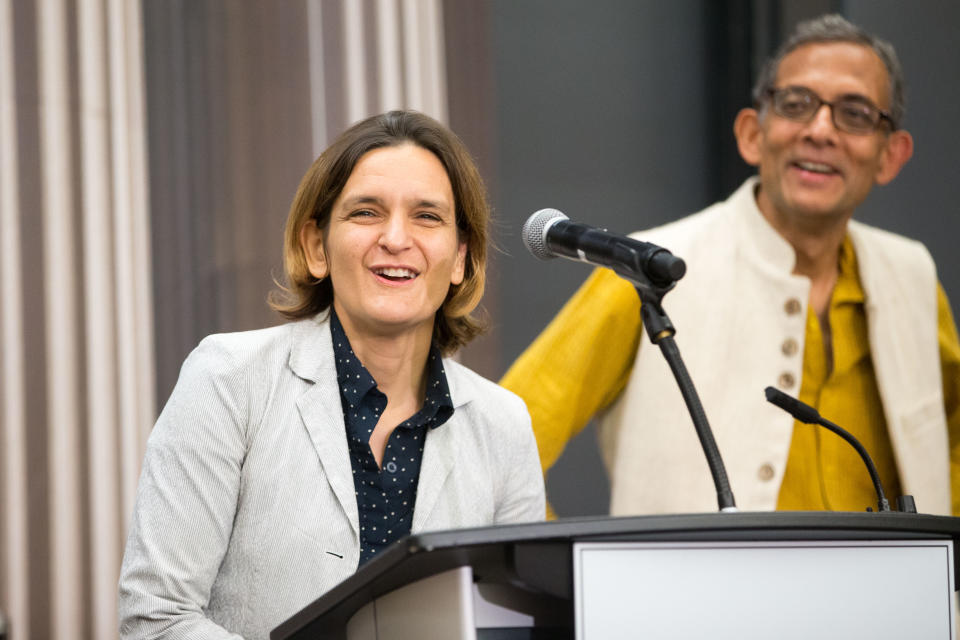Nobel Prize winner: Reducing poverty can rebuild 'trust' in economics
Economists face a reputational problem, and Nobel Prize winner Esther Duflo hopes her research in reducing global poverty can rebuild public trust in the profession.
Duflo, a professor at the Massachusetts Institute of Technology, told Yahoo Finance’s The Final Round on Monday that economists are viewed as forecasters, but acknowledged that the profession has had a “terrible” track record of predicting future outcomes.
“No wonder people don’t trust us,” Duflo said, referencing a YouGov poll of British adults from 2017 noting that politicians are the only profession trusted less than economists.
She hopes the field of development economics can repair the perception of economics by reducing poverty.
Duflo, along with her husband Abhijit Banerjee and Harvard professor Michael Kremer, won this year’s Nobel Prize in economics for their field studies in impoverished corners around the world. Their studies cover a wide range of topics, from immunization to nutrition to education.

Duflo, 47, is only the second woman and the youngest person to ever win the Nobel Prize in economics.
In most of their projects, Duflo and her colleagues teamed up with local non-governmental organizations to set up randomized controlled trials to measure the impact of a proposed program. For example, one study in India identified multiple schools in the same community and randomly selected some of those schools to test a computer-assisted curriculum.
After the program was implemented for some time, the researchers compared the progress at schools that received the program with the progress of schools that didn’t. The result: computer-assisted learning boosted math scores, although the gains began to fade after a year.
Randomized controlled trials could help policymakers test the effectiveness of certain programs based on what communities they are employed in and how they are administered.
“You have to move from the big defined questions like ‘why are countries poor and ‘does aid work,’ to better-defined questions,” Duflo said.
Rethinking welfare
Duflo also hopes that economics can address some of the social issues that reinforce the “poverty trap,” the idea that there are structural forces that reduce the likelihood that the poor can experience social mobility.
One of those forces: the negative stigma associated with welfare programs designed to help the needy. Duflo and Banerjee dug deeper into low immunization rates in India despite the fact that immunization services are free. Using a randomized controlled trial, they found that offering a free bag of lentils with a vaccine increases immunization rates. More importantly, they found that compared to simply increasing the supply of vaccines and immunization camps, offering bonus incentives came at a cheaper cost.
But Duflo worries that policymakers in rich and poor countries are too obsessed with the “implicit bias” that using welfare programs is a form of taking advantage of the system.
"The people who don't need welfare are so trained in thinking that requiring help is demeaning that they are terrified of any change,” Duflo said.
Duflo and Banerjee recently released their new book, “Good Economics for Hard Times,” describing their studies and their broader thoughts on economics.
Brian Cheung is a reporter covering the banking industry and the intersection of finance and policy for Yahoo Finance. You can follow him on Twitter @bcheungz.
Trump: Stocks would be 25% higher if the Fed had not raised rates
Federal Reserve officials say they 'can't afford to ignore' climate change
SF Fed's Daly: No more rate cuts unless there's a 'material change'
‘The weirdest place in the world’: What the Fed missed in Jackson Hole
Read the latest financial and business news from Yahoo Finance
Follow Yahoo Finance on Twitter, Facebook, Instagram, Flipboard, SmartNews, LinkedIn, YouTube, and reddit.

